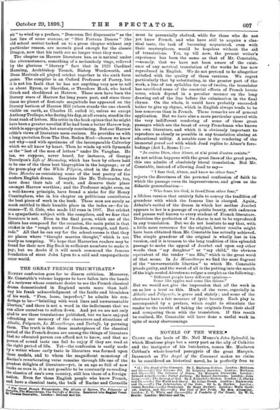THE GREAT FRENCH TRIUMVIRATE.*
HONEST confession goes far to disarm criticism. Moreover, Mr. Constable's volume happens to have fallen into the hands of a reviewer whose constant desire to see the French classical drama domesticated in England meets more than half- way his frank acknowledgment of the faults and blemishes of his work. "Free, loose, imperfect," he admits his ren- derings to be—" bristling with weak lines and unwarrantable liberties," and there is not a word in the indictment that' we can allow ourselves to soften down And yet we are not only glad to see these translations published, but we have enjoyed refreshing our memory of the characters and situations of Athalie, Polyeucte, Le Misanthrope, and Tartuffe, by perusing them. The truth is that these masterpieces of the classical period of the French drama are among the things of literature that no educated person can afford not to know, and that no person of sound taste can fail to enjoy if they are read at the right period of life. Yet—the confession is easily made by a writer whose early taste in literature was formed upon these models, and to whom the magnificent monotony of Racine's reverberating verse remains through life one of the greatest delights of literature—yet, in an age so full of new books as ours is, it is not possible to be constantly re-reading the classics of one's own country, still less those of a foreign nation. Even for those English people who know French, and have a classical taste, the bulk of Racine and Corneille The Great French Triumvirate: The Athalie of Basins, The Polveuete of Corned!. The Misanthrope, The Tartuffe of Molter.. Rendered into lastudt Vaasa bThoase Countable. London : Downey and Os. must be perennially shelved, while for those who do not yet know French, and who have still to acquire a clas- sical taste, the task of becoming acquainted, even with their masterpieces, would be hopeless without the aid of translations. Yet, up till now, the present writer's experience has been the same as that of Mr. Constable, —namely, that we have not been aware of the exist- ence of any metrical translation of the works he has now reproduced in English. We do not pretend to be altogether satisfied with the quality of these versions. We regret particularly that by substituting, in the greater part of the work, a line of ten syllables for one of twelve, the translator has sacrificed some of the essential effects of French heroin verse, which depend in a peculiar manner on the long drawing out of the line before the culmination in the final, rhyme. On the whole, it would have probably succeeded better to give up rhyme, which in English always tends to be less sonorous than in French. These remarks are of general application. But we have also a more particular quarrel with the very indifferent rendering of some of those great passages which are the boast of every Frenchman who knows his own literature, and which it is obviously important to reproduce as closely as possible in any translation aiming at. educational utility. A notable case is the rendering of the immortal grand mot with which Joad replies to Abner's fore- bodings (Act I., Scene 1) :—
" Je train Dieu, cher Abner, et n'ai point d'autre crainte."
As not seldom happens with the great lines of the great poets,. this one admits of absolutely literal translation. But Mr. Constable, instead of allowing Joad to say- " I fear God, Abner, and know no other fear,"
rejects the directness of the personal confession of faith to which the passage owes its impressiveness, and gives us the didactic generalisation-
" Who fears his God, is freed:from other fear,"
a lifeless version that entirely fails to convey the tradition of grandeur with which the famous line is charged. Again, Athalie's recital of the dream in which her mother Jezebel appears to her is a, passage of exquisite beauty, with cadences and pauses well known to every student of French literature. Doubtless the perfection of its charm is not to be reproduced in any translation. But we do not hesitate to say that, with a little more reverence for the original, better results might, have been obtained than Mr. Constable has actually achieved. The simple grandeur of the original is wholly lost in his version, and it is treason to the long tradition of this splendid passage to make the appeal of Jezebel end upon any other words than " my daughter " or " my child," the obvious equivalent of the tender " ma fille," which is the great word of that scene. In Le Misaathrope we find the most flagrant of the "unwarrantable liberties" to which Mr. Constable pleads guilty, and the worst of all is the putting into the month of the high-sonled Alcestes so vulgar a couplet as the following :: " Different people have different opinions—
Some like apples and some like inions."
But we would not give the impression that all the work is on so low a level as this. Mach of the verse, especially in Athalie and Polyeucte, is grave and stately ; and some of the choruses have a fair measure of lyric beauty. Each play is accompanied by a preface, which ought to stimulate the reader to the trouble of taking the originals from their shelf and comparing them with the translation. If this result be realised, Mr. Constable will have done a useful work is spite of many shortcomings.






































 Previous page
Previous page